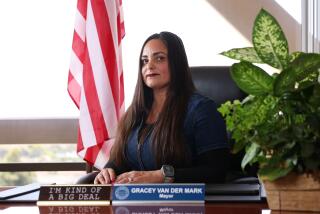‘Who Am I?’--a Basic Right : Adoption: The necessity of opening birth records far outweighs the old-fashioned concern about an unwed mother’s ‘stigma.’
- Share via
I called the Orange County Adoption Bureau a few months ago. I told them that I was adopted and that I wanted information about my birth parents. They told me “no.” I couldn’t accept that answer.
I have always known that I was adopted. Through elementary school and the first years of junior high, it was no big deal. It didn’t matter who my birth mother was. After all, she had only carried me for nine months. My adoptive parents had loved and cared for me ever since.
Then high school came. As my friends began noticing family traits in themselves--Mom’s figure, Dad’s eyes--I walked through shopping malls looking at women who even slightly resembled me and wondered about these things.
The woman who “only carried me for nine months” started to gnaw at my imagination. Who was she? What kind of life did she lead? Was she the CEO of some grand corporation? Or a bag lady?
And did she ever wonder about me?
WHO AM I? I still don’t know. At 22, I don’t know whose nose I have, my genealogy, my family medical history, why I weighed about as much as a cantaloupe at birth. These are gaping holes in my life. I want to fill those holes. And I am not alone.
Adoption touches one in eight Americans, and the numbers grow daily. Yet in 47 states, adoption records are sealed. Why? Because state laws are outdated. When adoption laws were written in California 50 years ago, they were designed to protect children from the stigma of being adopted. They were designed to protect the confidentiality of birth mothers filled with the shame of having a child out of wedlock. They were designed to protect adoptive parents from intrusion by birth parents. Society has changed in the past few decades. Today it is not the possibility of contact between birth parents and their children, but the near impossibility of that contact that is so distressing.
Soon after I was rebuffed by the adoption bureau, I learned that a bill to change all this was beginning its journey through the Legislature. I called the sponsoring assemblyman’s office and was told that it would have a hearing the next day.
I wanted to go. I had to go. It was a moral imperative that I miss class, borrow a car, drive the 400 miles to Sacramento and attend that hearing. The people up there needed to know that this bill is necessary to my health and welfare, damn it.
A few hours later I was riding through the night to the state capital. My mind was racing faster than my friend was driving. If this bill passes, what will I do? Will I look for my birth mother? Will I find her?
“What about her right to privacy?” my friend asked.
“What about my rights?” I snapped. “I have the right to know my history like everyone else. I am sick and tired of laws that subordinate the rights of children to the rights of adults. And I am not a child.”
She turned the radio back up.
I confess that I did question whether my birth parents would support repeal of the confidentiality rule. When an adoptee reaches the age of majority, 18, his or her adoption record would be open to review at the request of the adoptee, the adoptive parents or the birth parents. The bill is retroactive, which is where the controversy comes in.
There must have been more than 50 people in the Assembly committee room that day. I thought they were adoptees because they wore “Open my records” buttons. When I began to introduce myself I found nearly all of them to be birth mothers. Women who give up their children at 16, 17, 18 grow up. And they want to know, just as their children do, they were saying. I was stunned.
As people gave their testimonies, the legislators asked the same question my friend did. These officials, I thought . . . They just don’t get it, do they? They continued to debate birth parents’ right to privacy, and we grew more anxious as we saw our empty pasts flash before us.
In the end, the committee agreed that “the benefit of the child is greater than the perceived harm to the birth parent” and the bill was passed out of committee with one amendment: A public information campaign would be conducted, and birth parents who wished to retain confidentiality would have one year in which to notify the state, which would respect their request.
Now the bill is headed for a vote.
I want it to pass. Not just for my right to a full identity. Not just for the sake of children I might have some day. The first thing I want to know is, whose nose do I have?
More to Read
Sign up for Essential California
The most important California stories and recommendations in your inbox every morning.
You may occasionally receive promotional content from the Los Angeles Times.










